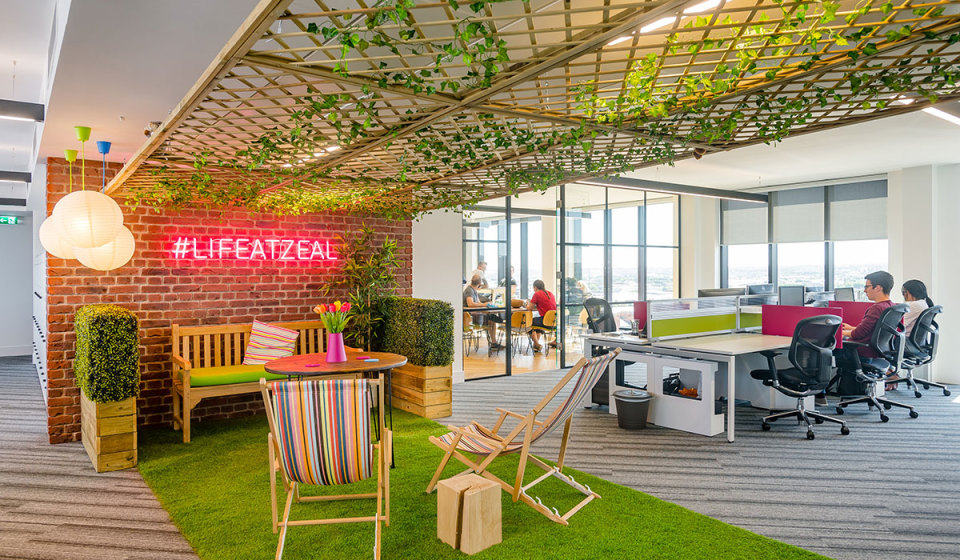'Self-employed people are often lonely': how collaborative workspaces build relationships and improve wellbeing
By Bruntwood Works

As working habits change, co-working spaces that put people at their heart are finding popularity with small businesses and entrepreneurs.
If there’s one thing most successful businesses have in common, it’s a strong professional network. From institutional networking organisations to local business community groups, opportunities to build mutually supportive relationships with like-minded professionals are the lifeblood of many a thriving enterprise.
Jane Rutter set up Zeal, a digital and creative agency, eight years ago. She attributes “a significant proportion” of its growth to the networks she’s built as a direct result of utilising co-working spaces. The business currently has two offices; one based in a Bruntwood building in Leeds and another in a similar collaborative co-working space in London. Bruntwood provides inspiring workspaces and office environments across 140 buildings in the north and Midlands.
Basing the team in co-working spaces “really helped us grow as an agency because it generates so many new leads,” she says. “There are always useful networking events happening, and there’s a customer community portal we can use to communicate with other businesses based in the same building who we’d like to explore working with.”
As well as creating easily accessible networking opportunities, Rutter says working alongside other businesses in shared spaces has created a ready-made sense of community for her and her team, enhancing both professional development and personal wellbeing.
“There’s a whole schedule of wellbeing programmes on offer that boost staff morale and encourage personal development, from yoga classes and free ice-cream to knowledge-sharing sessions where you can pick up new skills,” she adds.
Networks play another important role – offsetting the sense of isolation that many business owners feel. Burnout is common among entrepreneurs, but having people to bounce ideas off or sense-check a piece of work can be enormously reassuring.
“Loneliness is one of the biggest problems for the self-employed – particularly freelancers – but being part of a collaborative workspace allows you to build relationships with others in your position who understand the pressures of being in business,” says Carl Reader, author of The Startup Coach and The Franchising Handbook.
“While friends and family understand that self-employment is different, they don’t always fully appreciate the challenges that a business owner faces every day. There’s also a business benefit from the new relationships you build – when business associates get to know you and your business, they can become a great source of new work. Sometimes, that’s the perfect medicine for the stress of self-employment.”
From a psychological perspective, being part of a business network has had a “massive” impact on Rutter, offsetting the sense that she carries the full weight of the business on her shoulders and that there’s nobody to turn to for advice or input.
“As a direct result of the workspaces we’ve used, I’ve made lots of friends who run their own agencies, and they’re the people I turn to when I lose a client or have a big win to celebrate,” she says.
“I can tell friends about the challenges I’m facing and they’ll offer support and buy me a drink, but my professional network will offer support, buy me a drink, and then talk me through the practicalities of what I should do or how they dealt with a similar situation.”
Ultimately, of course, people are employed to deliver results for an employer, which is why investing in their wellbeing is simply good business practice.
“Happy, healthy people are the biggest asset to any business. Human beings aren’t just units of production, and workspaces that treat them as such create a battery hen experience where wellbeing suffers, presenteeism reigns and productivity drops,” says Toby Sproll, director of retail, amenity and community at Bruntwood.
He points out that the way in which people work is evolving, and working environments need to reflect that. “New trends and technologies are changing workplace habits, so modern businesses need flexible workspaces, and that means the design of office buildings and the spaces within them have to have people at their heart.”
Businesses are also very much part of the communities in which they are based, and Bruntwood is passionate about supporting these areas, their arts and culture, in its position as a philanthropic investor-holder. It donates 10% of all profits to local good causes and also grants employees two paid “Bruntwood Cares” days per year to spend volunteering with local community projects.
Sproll says: “Work takes up so much of our daily lives – wouldn’t it be better if you could have some fun, learn something new, and potentially make a difference to your local community while you’re there?”
Non-independent content produced as part of a commercial deal with Guardian Labs.